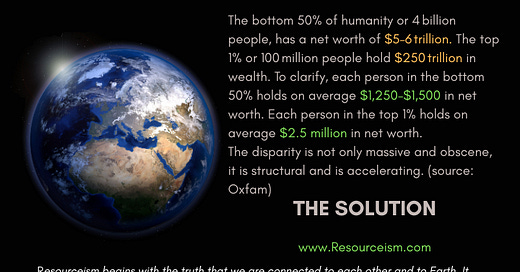‘‘Instead of measuring success by GDP and stock market gains, Resourceism invites us to measure well-being, dignity, and shared abundance.’’
We are living in an age of astonishing technological advancement and global connection, yet our economic system remains deeply broken. The image above reveals a stark truth: the bottom 50 percent of humanity, around 4 billion people, share just $5 to $6 trillion in wealth. In contrast, the top 1 percent, about 100 million people, control $250 trillion. The average person in the bottom half of the world’s population holds only $1,250 to $1,500 in net worth. Meanwhile, each person in the top 1 percent enjoys an average of $2.5 million. This is not a gap. It is a chasm.
Such a level of inequality is not only economically unsustainable but morally indefensible. It did not arise by accident. Nor is it a natural result of merit or hard work. This disparity is the result of a system that rewards hoarding, punishes need, and treats basic human rights as luxuries. What we are witnessing is not a glitch. It is the system working exactly as it was designed to, enriching the few at the expense of the many.
The solution offered by #Resourceism is both radical and commonsense. It starts by rejecting the myth of separateness. We are not isolated individuals in a zero sum game. We are part of a larger, living system, interconnected with one another and with the Earth itself. In this context, housing, food, clean water, education, and health care are not privileges to be bought and sold. They are birthrights.
Resourceism envisions a future where machines handle labor, and humans reclaim their time and purpose. It does not reject progress. It redefines it. Instead of measuring success by GDP and stock market gains, Resourceism invites us to measure well-being, dignity, and shared abundance.
In a world with enough for all, the continued existence of mass poverty is a political and moral choice. Resourceism calls us to make a different one.
Learn more at: https://www.resourceism.com/




